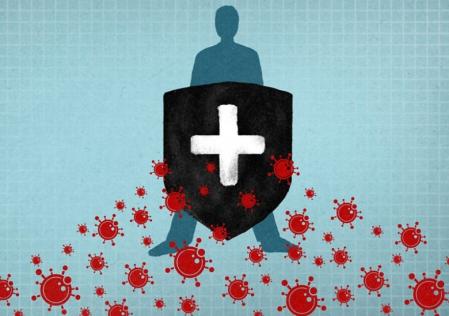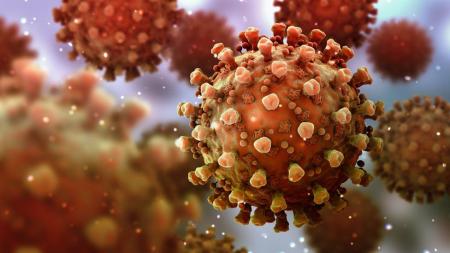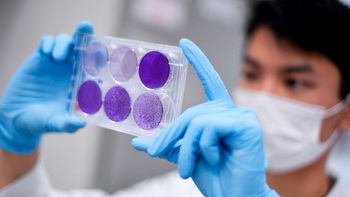路 哥 Master
用 足 够 的 思 考 认 知 世 界
本文转载自BBC官网,发表于2020年12月16日,对新冠病毒免疫的一些基本问题进行的说明解释。希望可以让你增加一些关于新冠病毒的常识。
同样,本文提供英中对照,方便有兴趣的朋友查阅学习,中文翻译来自DeepL人工智能翻译,个别字句根据我自己的理解做了一点点的修正。
关于病毒特别是新冠病毒,在很短的时间内人类获得的信息仍然远远不够,免疫力并不等于完整的保护。个人理解,未来的疫苗也许并不能提供完全的保护(包括较长的时间跨度的原因),所以适当的个人防护,还是第一要务。
- - - - - - ◇ - ◇ - ◇ - - - - - -
Covid immunity: Can you catch it twice? 新冠病毒免疫力:你能感染两次吗?
By James Gallagher; Health and science correspondent 作者:James Gallagher; 卫生和科学记者
Coronavirus is a completely new infection in people.
Nobody had immunity at the start of the pandemic - and knowing more about immunity is crucial for understanding what happens next.
冠状病毒是一种全新的人类感染。
在大流行开始时,没有人有免疫力 - 而更多地了解免疫力对于了解接下来会发生什么至关重要。

How do you become immune to coronavirus?
如何对冠状病毒产生免疫力?
Our immune system is the body's defence against infection and it comes in two parts.
The first is always ready to go and leaps into action as soon as any foreign invader is detected in the body. It is known as the innate immune response and includes the release of chemicals that cause inflammation and white blood cells that can destroy infected cells.
But this system is not specific to coronavirus. It will not learn and it will not give you immunity to the coronavirus.
Instead you need the adaptive immune response. This includes cells that produce targeted antibodies that can stick to the virus in order to stop it - and T cells that can attack just the cells infected with the virus, called the cellular response.
我们的免疫系统是人体抵御感染的防线,它分为两部分。
第一部分是随时准备好的,一旦检测到体内有任何外来入侵者,它就会立即采取行动。它被称为先天性免疫反应,包括释放引起炎症的化学物质和可以破坏受感染细胞的白血球。
但是这个系统并不是专门针对冠状病毒的。它不会学习,也不会让你对冠状病毒产生免疫力。
相反,你需要适应性免疫反应。这包括产生有针对性的抗体的细胞,这些抗体可以粘附在病毒上以阻止病毒--而T细胞可以只攻击被病毒感染的细胞,称为细胞反应。
This takes time - studies suggest it takes about 10 days to start making antibodies that can target the coronavirus and the sickest patients develop the strongest immune response.
If the adaptive immune response is powerful enough, it could leave a lasting memory of the infection that will give protection in the future.
It's not known if people who have only mild symptoms, or none at all, will develop a sufficient adaptive immune response.
Understanding of the role of T-cells is still developing, but a recent study found people testing negative for coronavirus antibodies may still have some immunity.
For every person testing positive for antibodies, it was found two had T-cells which identify and destroy infected cells.
"They look rather durable and are being made in almost all exposed people," said Prof Danny Altmann from Imperial College London.
这需要时间 - 研究表明,开始制造能够针对冠状病毒的抗体需要10天左右的时间,而病得最重的患者会产生最强的免疫反应。
如果适应性免疫反应足够强大,它可能会留下对感染的持久记忆,在未来给予保护。
目前还不知道只有轻微症状的人,或者完全没有症状的人,是否会产生足够的适应性免疫反应。
对T细胞作用的理解仍在发展中,但最近的一项研究发现,检测冠状病毒抗体阴性的人可能仍有一些免疫力。
对于每一个抗体检测阳性的人,发现有两个人有T细胞,可以识别和消灭受感染的细胞。
"它们看起来相当耐用,几乎所有暴露的人都在制造T细胞,"伦敦帝国学院的丹尼-阿尔特曼教授说。

The immune system's memory is rather like our own - it remembers some infections clearly, but has a habit of forgetting others.
Measles is highly memorable - one bout should give lifelong immunity (as the weakened version in the MMR vaccine does). However, there are many others that are pretty forgettable. Children can get RSV (respiratory syncytial virus) multiple times in the same winter.
The new coronavirus, Sars-CoV-2, has not been around long enough to know how long immunity lasts, but there are six other human coronaviruses that can give a clue.
Four produce the symptoms of the common cold and immunity is short-lived. Studies showed some patients could be re-infected within a year.
Research at King's College London also suggested levels of antibodies that kill coronavirus waned over the three month study.
But even if antibodies disappear, then the cells that manufacture them, called B cells, may still be around. B cells for Spanish Flu have been found in people 90 years after that pandemic.
If the same is true with Covid, then a second infection would be milder than the first.
It is also not understood what happens to T cells in the long term. But T cells against the original Sars (Severe Acute Respiratory Syndrome) have been found 17 years later.
免疫系统的记忆力就像我们自己的记忆力一样--它能清楚地记住一些感染,但有忘记其他感染的习惯。
麻疹的记忆力很强 - 接种一次就能获得终身免疫力(正如MMR疫苗中的弱化版一样)。然而,还有很多其他的疾病是非常容易忘记的。儿童可以在同一个冬天多次感染RSV(呼吸道合胞病毒)。
新的冠状病毒Sars-CoV-2,还没有出现多久,不知道免疫力能持续多久,但还有其他六种人类冠状病毒可以提供线索。
四种会产生普通感冒的症状,免疫力也很短暂。研究显示,一些患者可能在一年内再次被感染。
伦敦国王学院的研究还表明,在三个月的研究中,杀死冠状病毒的抗体水平有所减弱。
但即使抗体消失了,那么制造抗体的细胞,即B细胞,可能仍然存在。西班牙流感的B细胞已经在那次大流行90年后的人中被发现。
如果新冠病毒也是如此,那么第二次感染会比第一次更温和。
目前仍不明白T细胞长期会发生什么。但17年后,已经发现了对抗最初的Sars(严重急性呼吸综合征)的T细胞。
Maybe.
The jury is still out on the field of "cross-reactivity" but there may be some infections that look similar enough to the virus that causes Covid that people may gain some protection.
Laboratory tests show the T cells some people made to fight Sars or common cold coronaviruses can also react against the new coronavirus.
How common this is and how much protection it gives is still unknown.
也许吧。
在 "交叉反应 "领域,仍然不能判断得出结论,但可能有一些感染看起来与导致新冠病毒足够相似,人们可能获得一些保护。
实验室测试显示,一些人为对抗萨斯或普通感冒冠状病毒而制造的T细胞也能对新的冠状病毒产生反应。
这种情况有多普遍,能提供多少保护,目前还不得而知。
There were early reports of people appearing to have multiple coronavirus infections in a short space of time.
But the scientific consensus is that testing was the issue, with patients being incorrectly told they were free of the virus.
Scientists from Hong Kong recently reported on the case of a young, healthy man who recovered from a bout of Covid-19 only to be re-infected more than four months later. Using genome sequencing of the virus, they could prove he caught it twice because the virus strains were different.
Experts say re-infection isn't surprising, but it's likely to be rare, and larger studies are needed to understand why this might happen.
Nobody has been deliberately reinfected with the virus to test immunity, but a pair of rhesus macaque monkeys have.
They were infected twice, once to build up an immune response and then a second time three weeks later. Those very limited experiments showed they did not develop symptoms again after such a quick reinfection.
早期有报道称,有人在短时间内出现了多种冠状病毒感染。
但科学界的共识是,检测是问题所在,患者被错误地告知没有感染病毒。
来自香港的科学家最近报道了一个年轻健康男子的案例,他在一次新冠的感染中康复,却在四个多月后再次被感染。利用病毒的基因组测序,他们可以证明他感染了两次,因为病毒株不同。
专家说,再次感染并不令人惊讶,但它很可能是罕见的,需要更多的研究去了解为什么这可能发生。
没有人故意重新感染该病毒来测试免疫力,但一对恒河猕猴已经感染两次了。(原文意思应该是为了试验而感染)
它们被感染了两次,一次是为了建立免疫反应,三周后再感染第二次。这些非常有限的实验表明,在如此快速的再感染后,它们没有再出现症状。

This is not guaranteed and that is why the World Health Organization is nervous about countries using immunity passports as a way out of lockdown.
The idea is if you pass the antibody test then you are safe to go back to work. This would be particularly valuable for staff in care homes or hospitals who come into contact with those at risk of developing severe symptoms.
But while you will find some antibodies in nearly every patient, not all are equal. Neutralising antibodies are the ones that stick to the coronavirus and are able to stop it infecting other cells. A study of 175 recovered patients in China showed 30% had very low levels of these neutralising antibodies.
That is why the World Health Organization says "that cellular immunity [the other part of the adaptive response] may also be critical for recovery".
Another issue is that just because you might be protected by your antibodies, it doesn't mean you cannot still harbour the virus and pass it onto others.
这是不保证的,这也是为什么世界卫生组织对各国使用免疫护照作为摆脱封锁的方式感到紧张的原因。
这个想法是,如果你通过了抗体测试,那么你就可以安全地回去工作。这对于护理院或医院的工作人员来说尤其有价值,因为他们会接触到有可能出现严重症状的人。
但是,虽然您几乎在每个病人身上都会发现一些抗体,但并不是所有的抗体都是一样的。中和抗体是粘附在冠状病毒上的抗体,能够阻止它感染其他细胞。一项对中国175名康复患者的研究显示,30%的患者的中和抗体水平非常低。
这就是为什么世界卫生组织说 "细胞免疫适应性反应的另一部分]也可能是恢复的关键"。
另一个问题是,尽管你可能受到抗体的保护,但这并不意味着你仍然不能携带病毒并将其传给他人。
It matters for obvious personal health reasons and whether you will get Covid-19 multiple times and how often.
Immunity will also affect how deadly the virus is. If people retain some, even imperfect, protection then it will make the disease less dangerous.
Understanding immunity could help ease lockdown if it is clear who is not at risk of catching or spreading the virus.
If it is very difficult to produce long-term immunity, then it could make a vaccine harder to develop. Or it may change how the vaccine needs to be used - will it be a once a lifetime or once a year like the flu shot.
And the duration of immunity, whether by infection or immunisation, will tell us how likely we are to be able to stop the virus spreading.
These are all big questions we still lack answers to.
由于明显的个人健康原因,以及你是否会多次感染新冠病毒,以及感染的频率,这很重要。
免疫力也会影响病毒的致命程度。如果人们保留了一些,甚至是不完善的保护,那么会使疾病的危险性降低。
如果清楚谁没有感染或传播病毒的风险,了解免疫力可以帮助缓解封锁。
如果很难产生长期免疫力,那么可能会使疫苗更难开发。或者可能会改变疫苗的使用方式--是一生一次还是像流感疫苗一样一年一次。
而免疫力的持续时间,不管是通过感染还是免疫,都会告诉我们有多大可能能够阻止病毒的传播。
这些都是我们仍然缺乏答案的大问题。
- - - - - - ◇ - ◇ - ◇ - - - - - -
谢谢观看!如果你觉得这边文章有用,请转发给你的朋友。
(END)
发表评论